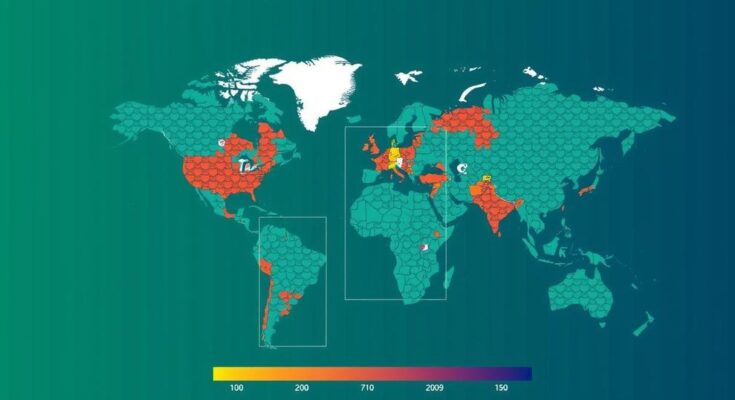The UNFCCC’s recent assessment reveals that current national climate pledges will result in only a 2.6 percent reduction in emissions by 2030, far below the 43 percent reduction needed to meet Paris Agreement targets. With COP29 approaching, there is an urgent call for nations to present stronger commitments to combat climate change.
Current climate pledges by nations are alarmingly inadequate in addressing the looming threat of climate change, according to a recent assessment by the United Nations Framework Convention on Climate Change (UNFCCC). The report discloses that the commitments made by various countries, referred to as nationally determined contributions (NDCs), will only reduce greenhouse gas emissions by a mere 2.6 percent between 2019 and 2030. This represents a slight increase from last year’s 2 percent projection but falls drastically short of the 43 percent reduction deemed necessary by scientists to adhere to the Paris Agreement’s target of limiting global temperature increases to 1.5 degrees Celsius. The urgency for nations to deliver enhanced climate pledges grows as the deadline for new NDCs approaches in February of the following year. Simon Stiell, UNFCCC Executive Secretary, emphasized the critical nature of this juncture: “Current national climate plans fall miles short of what’s needed to stop global heating from crippling every economy and wrecking billions of lives and livelihoods across every country.” The upcoming COP29 climate negotiations in Baku will serve as a pivotal forum for countries to propose more ambitious climate commitments, while discussions will also focus on establishing a new global emissions trading system and a financial package aimed at aiding developing nations in achieving their climate objectives. Pablo Vieira, global director of the NDC Partnership, noted the need for these new NDCs to attract both public and private investments to ensure their feasibility. Compounding these challenges, a distinct report from the World Meteorological Organization (WMO) highlights that greenhouse gases are currently accumulating in the atmosphere at rates unparalleled in human history, with carbon dioxide concentrations experiencing an alarming 11.4 percent increase over the past two decades. Last year’s spike in CO2 levels, attributed largely to extensive wildfires including those in Canada, underscores the profound impact of climate inaction. Without significant alterations to the pledges, the prospects of meeting the Paris Agreement’s goals seem increasingly dismal. As Celeste Saulo, WMO Secretary-General, warns, “These are more than just statistics. Every part per million and every fraction of a degree temperature increase has a real impact on our lives and our planet.”
The discussion of climate change and national pledges to reduce greenhouse gas emissions is framed against the backdrop of the 2015 Paris Agreement, where nearly 200 nations committed to preventing dangerous levels of global warming. The UNFCCC’s annual assessment reveals how far current commitments fall short of the necessary targets. With the next round of climate negotiations, COP29, set to take place soon, the urgency for countries to step up and deliver more effective and ambitious pledges reflects the intense pressure from scientists and environmentalists to act decisively to mitigate climate change risks. As greenhouse gas concentrations rise significantly, there is a growing concern about the real-world effects of inaction, which include worsening natural disasters, economic instability, and threats to livelihoods.
In summary, the latest UN report indicates that nations’ climate pledges are insufficient in countering the escalating threat of climate change, with an estimated emission reduction of only 2.6 percent by 2030. The demands for a 43 percent reduction are critical to meet the targets set forth in the Paris Agreement. The forthcoming COP29 conference serves as a crucial opportunity for countries to strengthen their commitments and devise actionable strategies to mitigate greenhouse gas emissions and finance climate initiatives, particularly in developing nations. Overall, the findings highlight a pressing need for enhanced climate actions to avoid catastrophic consequences for the global environment and humanity.
Original Source: www.aljazeera.com




